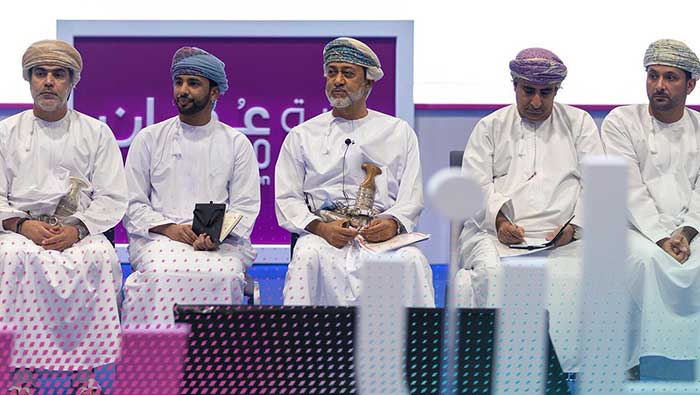
Muscat: Omani jobseekers should not wait for a government job, but rather, aspire to start their own initiatives, according to His Highness Sayyid Haitham bin Tariq Al Said, Minister of Heritage & Culture and Chairman of the Main Committee of Oman 2040 vision.
Speaking at a session specifically dedicated to the Omani youth, Al Said referred to employment opportunities and jobseekers, saying, “I call on young people to take the initiative, seize opportunities, accept the private sector and not wait for a government job.”
During the session, Sayyid Haitham listened to key ideas from the 2040 youth platform, which was part of the two-day 2040 vision conference.
Sayyid Haitham also called on young people to strive to acquire the skills and experiences required in the labour market, as these would positively affect his/her work and improve performance.
Ahmed Al Khonji, Head of the part-time and flexible movement of labour initiative at the Ministry of Manpower, told Times of Oman: “Currently, all the means are available for Omani youth to start initiatives in the private sector, including legislations, banks and financial institutes. All that is left for them is to take the first step.”
“It is not that the jobseekers aren’t accepting of the private sector, but it comes down to proportions and imbalance. Now, we need to focus on this aspect and the role of the private sector as a key partner for the society and the government,” added Al Khonji
The same sentiment was echoed by Dr SL Gupta, Dean, Waljat College of Applied Sciences, who said the next generation of jobseekers needed to embrace the private sector.
“Earlier, Omani students were very keen on searching for government jobs, but now, that is no longer the case, because there has been a paradigm shift in the necessities of the market, and the private sector needs more employees,” he told Times of Oman. “We are also helping our students to better their skills by teaching them about communication, holding CV writing workshops, and next April, we are also going to hold a career fair where around 50 companies will be expected to come. We do this every year.”
Lateef Shahdad, General Manager of Mass International, reiterated the importance of jobseekers not relying on the government sector, saying, “It will lessen the burden on the government. It will also ensure there is more parity in the job market for Omanis.”
“Presently, there is a big disparity with lots of Omanis in the public sector but not as many in private sector companies. Having more Omanis in private sector jobs would make things more even for the national workforce,” said Lateef Shahdad.
It will also mean that the government will no longer have to create 30,000-40,000 private sector jobs, and instead, it could then be spread among private sector companies as well.
“For corporates like us, our main concern is how to accommodate the Omanis. For that, we need the government’s help,” added Shahdad.
During the session, Sayyid Haitham also discussed the importance of engaging students abroad in the process of formulating the vision.
“I salute every young man and woman with ideas and who would like to be heard, and I invite them to put those ideas forward because when the future vision is discussed, it is the future of their children. We do not differentiate between our youth at home and abroad.”
Regarding the guarantees to implement the vision, the chairman of the vision said: “We will prepare a programme to implement the vision. “The fifth 10-year plan will be the founding plan for the Oman 2040 vision. We cannot be sure that things will be easy in the first five years, as the application will require the change of some models and legal frameworks.”
“But with everyone’s cooperation, we will work hard to deal with the challenges,” he added. .
On the role of women in planning the future of Oman, he said, “Women are active partners and the Sultanate has preceded many countries with regard to women’s participation and they have already proved their success in various fields. There is no obstacle in their path to success.”
Ramanuj Venkatesh, a financial analyst, said, “For a long time now, overseas migrants have been integral to not just the development of the Omani economy and infrastructure, but the rest of the GCC countries as well, working hand-in-hand with the local workforces in these countries to identify and fill in the gaps present, while simultaneously training the local workforce to take over these jobs in the future.”
“But now, the companies in these countries are pursuing policies of Omanisation and other nationalisation programmes, so that their locals can get gainful jobs,” he added. “The private sector provides many opportunities for locals to learn and improve their skill sets, as well as promote growth and development. As this happens, we can expect the number of migrant workers to these countries to drop, which is what has been happening over the past few years.”